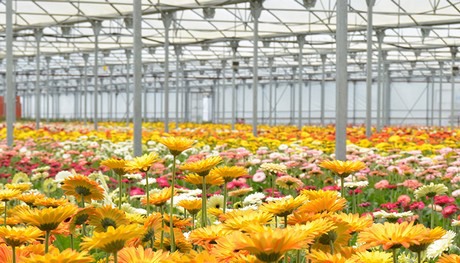Individual growers, like the horticultural sector as a whole, are facing major challenges in the next few years. GreenTech asked various young entrepreneurs about the opportunities and threats they identify with regards to their businesses. In this article, Joyce Lansbergen of LG Flowers, a gerbera grower from Pijnacker, the Netherlands, shares her thoughts on the possibilities of autonomous cultivation and making choices for the future.
How does the Dutch floricultural industry look like in ten years from now? That is a common question among many companies, organizations and individual growers active in horticulture. It is generally expected that the worldwide demand for flowers and plants will continue to rise in the coming years. One of the country's major banks, Rabobank, is even predicting an increase in consumption value of nearly 50 per cent. Countries like Kenya, Ethiopia and Colombia will become more important producers and also in Asia, the cultivation of flowers and plants will increase. But what does that all mean for the future of a traditional floricultural producer like the Netherlands?

Reduced assortment
Joyce Lansbergen together with her brother Mike represents the new generation within LG Flowers, a renowned producer of gerberas. The family company from the town of Pijnacker cultivates 75 million gerberas every year and has a strong focus on marketing. The company chose to do this via online channels and events and has refreshed its appearance. When asked about the future Joyce indicates she sees quite a lot of older entrepreneurs who certainly not all of them have a successor. ‘I think that various companies will not continue their operations. Because of the many niches in horticulture, I am wondering if this will lead to a reduction in assortment or that we will manage to hang on to the cultivation of these niche products.’ In any case, Joyce expects that countries like the Netherlands will become too expensive with regard to the production of many floricultural products. ‘Chances are that energy taxes and salaries will continue to increase. In that case I think it will be impossible to continue to compete with producers in, for instance, Africa. At some point, you just cannot make money anymore with standard products. That is why we will have to look for products which can help us to distinguish ourselves in the market.’
Joyce is curious about how the assortment will look like in ten years from now. ‘Personally, I would still like to run a floricultural company by then, but offering a more varied assortment than only gerbera. Now we have more than one hundred gerbera varieties, but when you can offer a more diverse product range, like you often see in other countries, you are much more flexible and you can meet customer demands more easily.’ However, whether Joyce will continue to grow flowers remains to be seen. ‘I also see major opportunities for certain content components like vitamin preparations or applicable types of rubber. I am looking forward to start working with such substances, either in addition to the flowers or as substitution. Gerberas are really beautiful flowers, but if I need to grow something different from tomorrow onwards, because that is the better choice for the company or society, I would not have a problem with that. In that case entrepreneurship wins over the love for a specific product.’ At the same time, Joyce realizes that changing crops will not be so easy. ‘You’re dealing with an inheritance from the past, think about the existing greenhouse, often with a mortgage. If you change crops, you’ll also have to change your greenhouse, which is rather capital intensive. Unfortunately, you cannot start over again just like that, it’s quite a challenge.’ Joyce thinks that partnerships with other growers can be a solution for solving these investing issues
Interesting for investors
Another result of the fact that older growers discontinue with their businesses is that a lot of specific knowledge on cultivation is disappearing with them. The lagging growth of new talents in horticulture is also of concern. ‘This means that you’re more dependent on external knowledge.'
The choice to grow autonomously could be a step in the direction of finding financiers.
Autonomous growing makes it possible to create success, even when you don’t have a green thumb.’ By using automated mathematical and management models, it will be easier to perform at the right time and achieve the highest possible yields and profits. Furthermore, because the final result depends less on people you can offer better guarantees, your company will become more interesting for investors who can help you develop your business.’
According to Joyce it is therefore important that entrepreneurs prepare for their own future. ‘Ask yourself what your future added value will be. And make your own choices in how to achieve that.’ The themes which are important for young people are changing, she says. There’s more attention for the environment, not everything is accepted at face value these days and there’s a growing need for transparency by sharing data. ‘This all means that there’re lots of opportunities for the horticultural sector. The new world is out there, but we still live in the old one. That is why I think we need to concentrate more on long term connections and relationships and to have the courage to make choices that have an impact beyond tomorrow.’
Source: GreenTech
